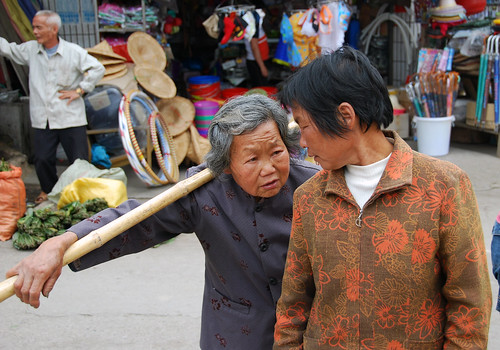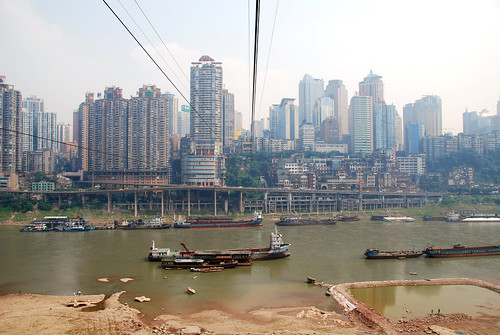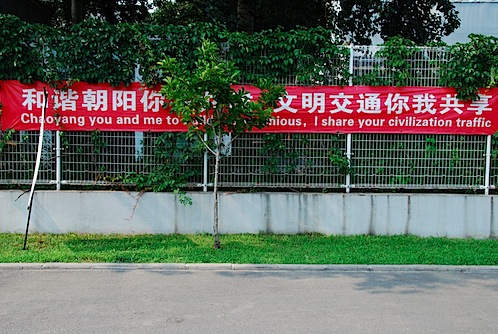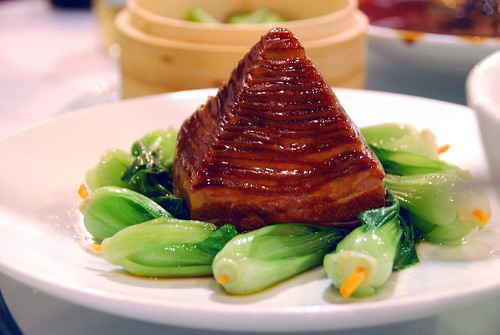Oh, the highs and lows of traveling through China! There were definitely some lows (see Qingdao: Confronting Identity in a German Town in China and Yangshuo: Anatomy of a Scam), but the peaks and the valleys seem to flow into one another so that you’re no longer sure what hurts so bad and what hurts so good. Our Yangzi Three Gorges River Cruise is the perfect metaphor: we spent three days on a 4th class river boat with a bunch of half-naked Chinese people who only stopped smoking cigarettes, spitting, and playing mahjong long enough to follow a megaphone-wielding tour guide around in 100 degree heat. Yes, it was unpleasant at the time. But even now, almost 3 months after the fact, we bring it up in conversation almost every week and giggle at the absurdity of it all. It’s sort of like running a marathon: when you’re in the moment, you can feel blinded by the pain, but once it’s over, you’re really glad you did it.

Ladies at the market near Hakka House.

View of Jiefangbei from across the Jialing River in Chongqing.
As Jeremy put it, “of all the countries we’ve been so far, China is the one I would have most regretted missing.” China is relevant, y’all. It is freaking fascinating there right now, a place where nothing stays the same for more than a few weeks, the government is still messing with people’s civil liberties in exchange for making them rich, and people are spitting on the street in their US$500 Gucci heels. We think every Westerner should go. Observe. Learn. And see what a country of 1.3 billion people all working together to pull their country up by its bootstraps looks like. There’s no place like it.
Days spent here: 43 (26 days in Southern and Central China, 17 days in the North)
Highlights: Huangshan, Yangshuo (for Jeremy), Yangzi River Three Gorges Cruise (somewhat painful, but also unforgettable), Beijing
Places we would like to visit next time: Western China (i.e., Tibet, Xinjiang, Jiuzaigou) and Mongolia
Average daily expenditures (for two people): US$213 for 13 days on our 5 star hotel/fancy eating tour with my parents (heavily supplemented by Jack and Wendy—thanks Mom and Dad!), US$120 for the remaining 30 days on our usual 1 star hotel/street food backpackers tour
Prices: China’s pretty reasonable. Food is very inexpensive (from US$5-10 per person per meal) and accommodation can be pretty cheap too. On average, we paid about 200 RMB (approx. US$30) per night for a double room ensuite. We used hostelbookers.com and Ctrip.com to book our accommodation, and we got great deals using both websites.
Weather: Do yourself a favor and don’t visit northern China in June or July, unless you like your searing heat with a dash of crushing humidity. Don’t say we didn’t warn you.
Language: There are 300 million people in China learning English right now—that’s the same number of people that live in the US! But you wouldn’t know it from traveling in this country. If you don’t speak Mandarin, polish your pantomiming skills before you go. On the other hand, if you are a wai guo ren with Mandarin speaking skills, prepare to be worshipped. The people will fall all over themselves with delight.
If you do speak Chinese, be warned that you will need to overcome not only regional accents, but regional phrases as well (ex. if you are from Taiwan, you will call a spoon a tiao gen, but a Beijinger will refer to it as a shao zi). For instance, I had the following conversation with a person in Taishan (in Chinese, of course):
Hope: Excuse me, do you know if there is a pharmacy around here?
Random Person: A what?!? A pharmacy?
H: Yes, a pharmacy.
RP: I don’t know. Why don’t you go ask over there [points to a pharmacy], at the medicine store?
Oh yeah, and if you’ve ever been interested in visiting China, go now, before all the Chinglish gets wiped out.

One day, China will be void of gems like this (reads: Chaoyang you and me to build harmonious, I share your civilization traffic)
Food: Outside of our eating tour with my parents and the food in Beijing, we weren’t too impressed with Chinese cuisine. We said it before and we’ll say it again: if you want the best Chinese food in the world, go to Taiwan.
That being said, China is a great place if your culinary hero is Anthony Bourdain. We got over ourselves really fast in Chongqing, where my aunt’s friends took us out to meals involving pig brains, duck tongues, cow rumen, and various other intestinal elements. You can also try snake, turtle, or live scorpions. Yum?
Transit: China’s got a pretty good rail system for such a big country. Chinese trains are not quite as nice as the trains in Taiwan or Japan, but they’re not as bad as the trains in Vietnam, either. For long journeys, you can purchase tickets for a soft sleeper (most expensive), hard sleeper, soft seat, or hard seat (cheapest). Soft sleeper trains are pretty nice, with 4 beds in each room, AC, clean sheets, and relatively clean bathrooms. “Hard sleeper” sounds scary, but it’s worth noting that hard sleeper beds aren’t hard—the mattress is just a little bit thinner. The biggest difference is that there are 6 beds in the hard sleeper rooms rather than 4. Since J and I are tall, we usually traveled in the soft sleeper trains, which are still relatively cheap, even though tickets are 1.5-2 times as much as the hard sleeper carriages.
For information on routes, schedules, and prices, check out ChinaTravelGuide.com’s fabulous online train schedule database.
The bigger cities like Shanghai and Beijing have subways, but Shanghai’s subway system has pretty bad signage and confusing connections. Beijing’s subway did not reach most of the sites in the city center, so we did a LOT of walking or took taxis. Luckily, taxis are very cheap in China’s capital city, but you’re going to have to speak Mandarin in order to get where you want to go.
Internet: Web access is great all over China—as long as the government isn’t blocking the site you want to surf. YouTube, Flickr, Facebook, Twitter, and all blogspot sites got blocked for periods of 3-10 days while we were in China due to the 20th anniversary of Tiananmen Square and the deadly Uighur protests in Xinjiang. Annoying.
Culture: Get ready for a culture shock. Get ready for people constantly cutting in front of you in line. Get ready for men walking around in inappropriate places with their shirts hiked up above their nipples. Get ready for spitting. Get ready for half-naked babies pooping in the street. Get ready for smoking. Get ready for LOUD. That being said, once you figure out how things work, it’s easy enough to deal with them.

Baby at the Summer Palace wearing the poop pants.
One fascinating thing about traveling through Taiwan and China is that we got a firsthand look at how differently these two countries developed culturally. The Taiwanese are exceedingly polite, aggressively helpful, and overly concerned about safety. The Chinese on the other hand, are rude and pushy, frequently uninterested in helping you, and some of the craziest drivers in the world. Now, you could point to many reasons for this cultural gap: the fact that it was the intellectuals and people of the upper classes that moved to Taiwan in 1949 to escape Communist persecution, the effect of 60 years of Communist rule on the people of China, etc. But I’d like to propose a different hypothesis: It’s the sheer numbers. There are 57 times as many people in China as Taiwan. You would get CRUSHED in China if you were nice and helpful to people all the time. The result is, if someone vouches for you in China (as my aunt did, in our case), you get extreme, excessive kindness from people that you may only marginally know you. But those same people on the street may wave you off if you ask for help. Yes, it’s a contradiction. But it’s a fact of life here. All I can say is, try to make friends with a local. If you do, you will get the red carpet rolled out for you.
In short: It’s not always pleasant, but that doesn’t mean it’s not a great time.



Hope: Your summary of travelling in China is very true and good.
The Chinese people have been under Communists control and ruling for 60 years, only the last 25 years (even they claimed the revision opened for 30 years now) they have been contacting with outside world. They still have many value and boundary to face to.
Your analysis of some of the experiences are very observant and realistic. I myself can not say any better than you have said so.
It is a very large country. The governments are not really as open as some of other modern and developed countries. It is still very tightly controlled society. The Beijing Olympics and 2009 Military parade infront of Tian-An Gate proves that their attitude and thoughts. They can be “perfect” when they want it to be. Otherwise, they do not relly care at all for some other matters that you and I fell to be important and meaningful.
However, Chinese people are lovely people, because basically, we are raised by and under Confucism, which not only affects us, but also Koreans, Japanese, Vietnamese and some other Asian peoples. Now the value of Confucism has been back and who in China still cares the value of so-called Communism? Thus, I believe the society will keep changing only to a better and ‘harmonious’ one. It takes time. We can not predict how long it will take. Maybe, it will happen for my generation to see it. Maybe not. But it can happen and it will happen one day.
Hope’s Dad
Jack meng at Chula Vista, CA, U.S.A.